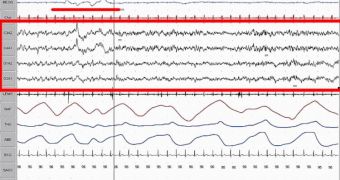A paper published in the latest issue of the scientific journal Annals of Neurology indicates that a disorder affecting rapid eye movements (REM) sleep can increase people's risk of developing Parkinson's disease, or experience progressive memory loss.
REM is a stage of deep sleep where the muscles are completely relaxed, and the brain dreams. Some sleep disorders act directly on the cortex, by preventing the onset of REM, and preventing individuals from getting the type of rest they need every single night.
Scientists at the Mayo Clinic were able to determine that patients suffering from such disorders are far more likely to develop mild cognitive impairment (MCI) or Parkinson’s disease as a result than peers who sleep soundly, PsychCentral reports.
What's more, the team was able to determine that it takes on average only 4 years for the aforementioned neural disorders to appear, after the sleep disorders have been diagnosed. This type of evolution is extremely fast, scientists explain.
The Mayo team say that people suffering from rapid eye movement sleep behavior disorder (RBD) are most likely to be affected by this condition. Patients tend to act out their dreams during REM, rather than experiencing the paralysis-like state of muscle relaxation that usually accompanies this stage.
“Understanding that certain patients are at greater risk for mild cognitive impairment or Parkinson’s disease will allow for early intervention, which is vital in the case of such disorders that destroy brain cells,” scientists Brad Boeve, MD, explains.
“Although we are still searching for effective treatments, our best chance of success is to identify and treat these disorders early, before cell death,” adds the expert, a coauthor of the new investigation, and a neurologist at the Mayo Clinic.
The findings are extremely worrying, considering that MCI is an intermediary-stage condition. It represents the symptomatic boundary between the normal effects that aging has on the brain and the onset of different forms of dementia.
MCI is an intermediate stage between the expected cognitive decline of normal aging and the more pronounced decline of dementia. In addition, Parkinson's is one of the more widespread conditions among senior Americans. More than 500,000 US citizens are currently suffering from this condition.
“This study is the first to quantify the risk associated with probable RBD in average people, not clinical patients, and it shows that we can predict the onset of some neurodegenerative disorders simply by asking a few critical questions,” Mayo behavioral neurologist and lead study author, Brendon P. Boot, MD, explains.

 14 DAY TRIAL //
14 DAY TRIAL //